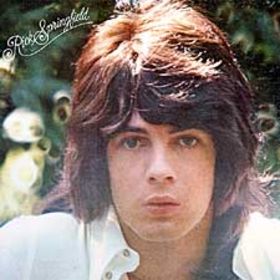
This one has been kicking around for at least 25 years. I bought back in the 80s, liked it, and put it in my collection. I then had a clean out and decided to get rid of it. Finally, I had a rethink and put it in the pile where it has been till now.
Bio from wikipedia, "Springfield was born in Sydney, Australia, the son of an Australian army career officer. In 1967, he dropped out of high school to begin his professional music career. His first appearance in a band was as a singer/guitarist in the band Rock House. In 1968, the band changed the name to MPD, Ltd, then embarked on a tour of Vietnam to entertain the troops stationed there. In 1969, Springfield replaced guitarist Roger Hicks in the Australian rock band Zoot, a position he held until the band's break-up in 1971.The 22-year-old Springfield relocated to Hollywood, California in 1972".
Rick Springfield for me is one of those guilty pleasures (he appeals to too much middle America/Australia/anywhere to be hip) as his work with the group Zoot was good, his 70s work was interesting, and his early 80s powerpop memorable. Unfortunately everything else is patchy. But all can be forgiven with the one true highlight of his career – the sheer powerpop magnificence of "Jessie's Girl".
"Powerpop" roots are usually traced back to the Beatles and others. According to wikipedia… Pete Townshend of The Who coined the term "power pop" in a 1967 interview in which he said "Power pop is what we play." As early as 1965, the Everly Brothers were playing music that can be called power pop. The duo's "I'll See Your Light" and "It Only Costs A Dime" displayed jangling guitars and an oblique harmonic approach that built upon the innovations of The Beatles and The Byrds. Those groups, along with The Who, The Small Faces and the Beach Boys, are often cited as the progenitors of power pop.
I wouldn't call The Who or the Kinks powerpop progenitors but this definition is otherwise sufficient.
Powerpop however – in all its shades – had been central to Springfield's sound from the start and permeates all his work (that I have heard).
Everything except one album … this one, his first solo LP. This album stands out as an anomaly.
It is singer-songwriter (Springfield wrote all the tracks) though it has been "produced" up.
It is more MOR than low fi introspective, though it is quite thoughtful.
Strings, and a full sound, abound.
The shadow of The Beatles lurks in the mix.
Springfield comes across as a less "adult" Neil Diamond,
and maybe that was the market they were aiming for
given Diamond's popularity at the time.
And it worked … the album and single did well in the US …. especially for an Australian. I think the only Top 40 chart action for an Australian rock act up till then was The Easybeats … you can do the googling.
Produced by legendary Australian guitarist Robie Porter (Rob E.G.), who also owned the Sparmac label, the sound is surprisingly crisp for an Australian of the time – possibly because it was recorded at Trident Studios in England. I notice the "direction" is by Steve Binder. I'm not sure what that means though it probably relates to the business side of things. Binder was a TV producer and the force behind the Elvis "68 Comeback Special". He probably had some significant effect on Springfield's subsequent successful US career in television and film.
Tracks (best in italics)
- Mother Can You Carry Me – a deep and meaningful ballad.
- Speak to the Sky – His hit and a bouncy, optimistic song – which is quite infectious.
- What Would the Children Think – "Eleanor Rigby" meets Ray Davies.
- 1000 Years – this sounds like something else I can't put my finger on – but the song works – especially the rushed chorus … which nicely juxtaposes the balladry in the verses.
- Unhappy Ending – overly dramatic … full of youthful drama – well he was 23 … not too bad though.
- Hooky Joe – some anti war lyric whimsy with oomm pa pa Beatles at their most Fellini-esque. There is also a banjo and a dog barking … not sure about all this.
- I Didn't Mean to Love You – dramatic, meaningful with a southern soul flavour … quite credible for a kid from Sydney …
- Come on Everybody – up tempo filler.
- Why? – a big ballad with an overly dramatic lyric … ahh the wounded heart.
- Ballad of Annie Goodbody – I don't know who Annie Goodbody is but she provided the inspiration for the only straight ahead rock song on the album, though the title could be a double entendre … "any good body" (get it?) will satisfy the narrators desires. Not too bad with its turned down Status Quo type riff ….
And …
This album is still touch and go …but I'll keep it ( for now).
Chart Action
USA
Album
#36 USA 1972
Singles:
Speak to the Sky #14 1972
What Would the Children Think #70 1972
What Would the Children Think #70 1972
England
zip
(Springfield never had a top 40 in the UK in either the singles or album charts – not even "Jessie's Girl" – Roland the Rat and the Dancing Frog have however been Top 20 there)
Sounds
Speak to the Sky
live
and attached
What Would the Children Think
1000 Years
Hooky Joe
live
Ballad of Annie Goodbody
and attached
Other:
Interview from the time (1972)
Zoot doing the Beatles
The big hit
Jessie's Girl
acting:
Bio
(originally posted: 01/08/2010)
